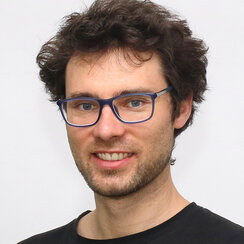Dr. Christoph Kurze
Dr. Christoph Kurze
- Wichtige Informationen: I am interested in understanding the intricate relationships between hosts and parasites. My research has led me to focus in particular on important questions about bee health.

Linkliste Christoph Kurze
Adresse - Dr. Christoph Kurze
- E-Mail Adresse: Christoph.Kurze(at)ur.de (öffnet Ihr E-Mail-Programm)
- Tel: +49-941-943-2997 (startet einen Telefonanruf, wenn Ihr Gerät dies zulässt)
- Standort: WNW D4, 1.305
- Wichtige Informationen: Fakultät für Biologie und Vorklinische Medizin
Universität Regensburg
Universitätsstraße 31
D-93053 Regensburg
I am interested in understanding the intricate relationships between hosts and parasites. My research has led me to focus in particular on important questions about bee health.
Primarily, I study ants and bees as model systems to addresses questions such as:
What factors shape the transmission dynamics of diseases in ant colonies? What can we learn from ants to develop effective strategies to reduce disease transmission?
How do parasites manipulate their hosts, and what mechanisms do hosts evolve to counter adapt?
How and which environmental features affect bee health and colony fitness across the complex urban ecosystem?
What are the sublethal risks that emerging infectious bee diseases pose to the health of individual bees and the fitness of the entire colony?
By exploring these and related questions, my research seeks to deepen our understanding of the complex interplay between hosts and parasites. Ultimately, I hope that my work can contribute to conservation and protection of bees as critical pollinators.

Figure 1. My study species include (A) the honey bee (Apis mellifera), (B) bumble bees (Bombus terrestris), (C) carpenter ants from Brazil (Camponotus rufipes) infected with a "zombie ant fungus" (Ophiocordyceps unilateralis), and (D) from North America (Camponotus pennsylvanicus), displaying traphallaxis (food exchange).
Bee health research

Figure 2. Experimental setups we use to study (A) flight performance, (B) foraging behaviour in bumble bees, and (C) honey bee cognition using classical conditioning.
Disease transmission research

Figure 3. (A) Experimental setup to study disease transmission dynamics and fungal spores spread in ant nests using (B) gfp transgenic fungal spores. (C) In addition to analysing ant movement, I use network analysis tools to study the relationship between ant interactions (see video 1 below) and transmission risks.
Curriculum vitae
| 2020-current | Postdoc, Universität Regensburg (Prof. Dr. Erhard Strohm) |
| 2019 | Feodor Lynen Return Fellow, MLU (Prof. Dr. Robert Paxton) |
| 2016-2018 | Postdoc/Feodor Lynen Fellow, Penn State (Dr. David Hughes) |
| 2012-2016 | PhD, MLU Halle (Prof. Dr. Dr. hc Robin Moritz) |
| 2015 | DAAD doctoral fellow, UWA Perth (Prof. Dr. Boris Baer) |
| 2010-2012 | MSc Biodiversity, Evolution & Ecology, FU Berlin Thesis at IZW Berlin (Dr. Marion East & Prof. Dr. Heribert Hofer) |
| 2009-2010 | ERASMUS at University of Aberdeen Honors project/Bsc thesis (Dr. Jeremy Sternberg & Prof. Dr. John Speakman) |
| 2007-2010 | BSc Biology JLU Gießen |
Grants and fellowships
| 2019 | Feodor Lynen Return fellowship, Alexander von Humboldt foundation |
| 2018 | Feodor Lynen postdoctoral fellowship, Alexander von Humboldt foundation |
| 2016 | Junior Scientist Grant, The Genetics Society IGSS Award, invited speaker at the International Congress of Entomology |
| 2015 | DAAD fellowship, German academic exchange service, for research visit in Australia ABF Award, Foundation for the Preservation of Honey Bees, Inc. |
| 2014 | Evenius Award, German society of bee research (AG Institute für Bienenforschung) IUSSI student travel award 2014, International Union for the Study of Social Insects |
| 2009 | ERASMUS scholarship |
Publications
For publications, please visit:
Copy rights of media: Christoph Kurze
